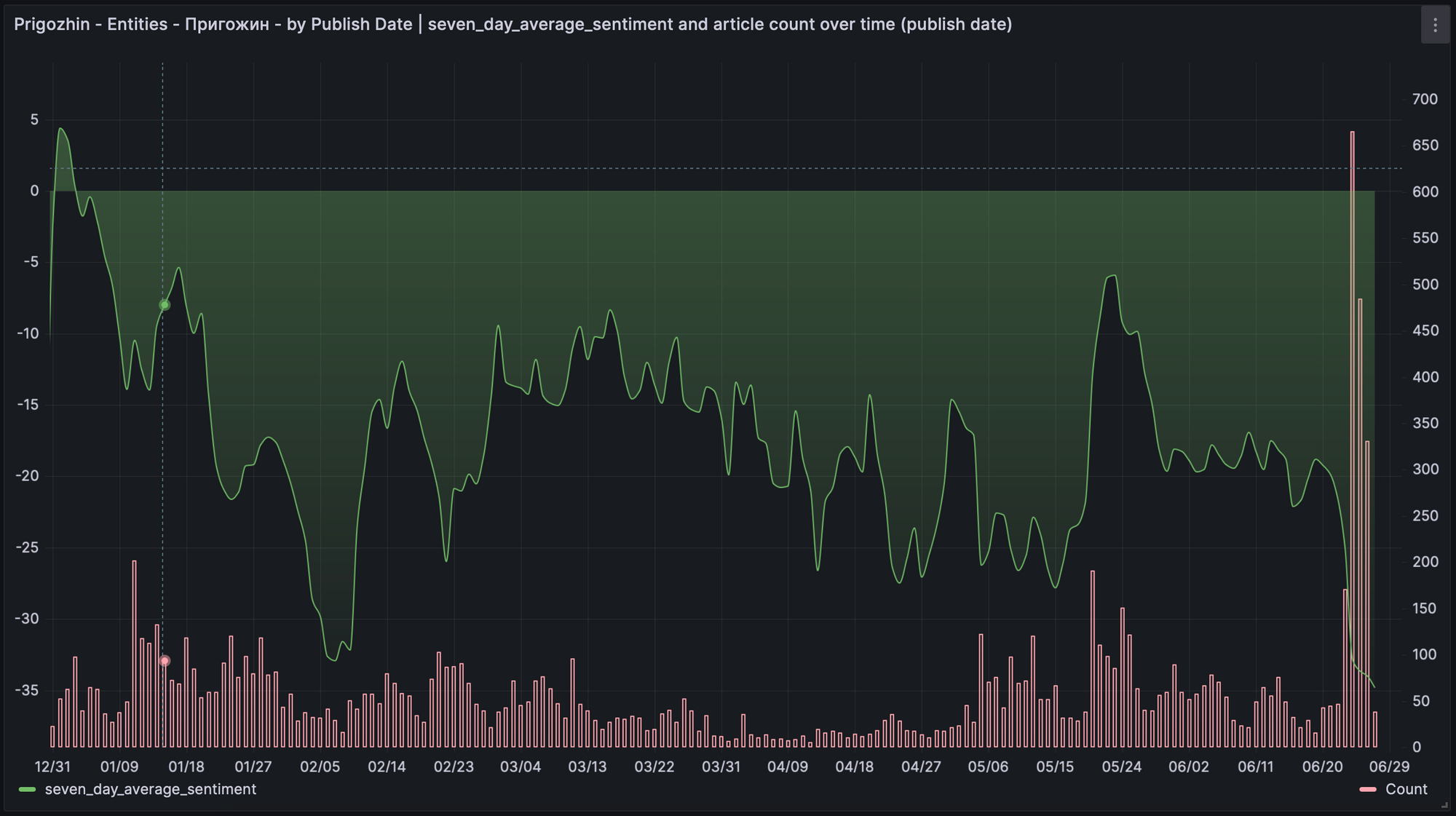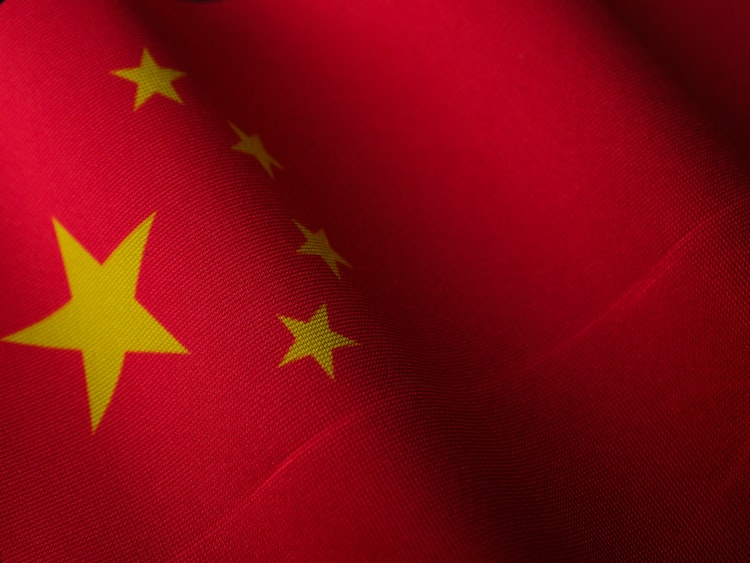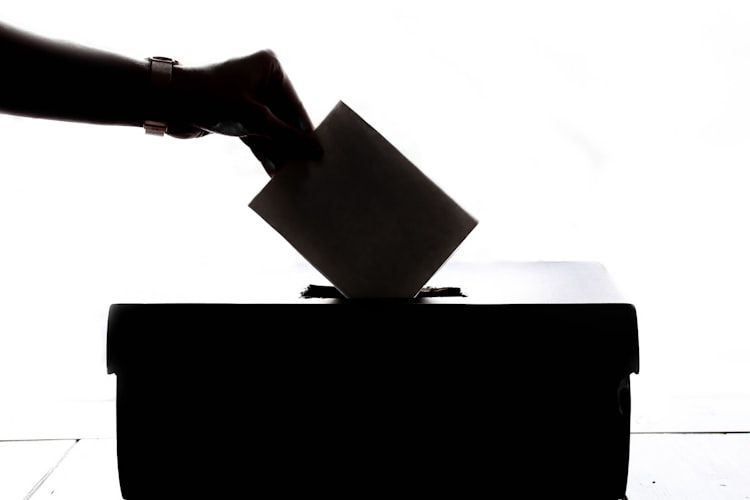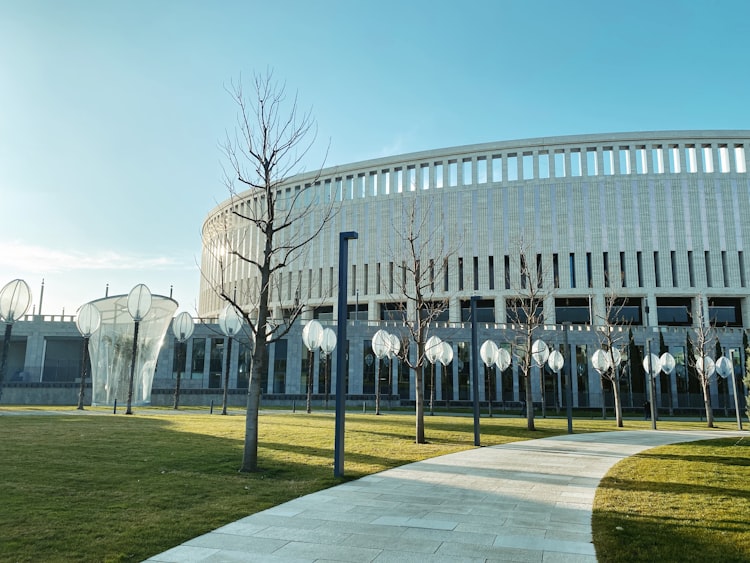Why the Insurrection Failed
Why the Insurrection Failed
Five Factors that Led to Prigozhin’s Downfall
Last weekend the world watched in amazement as Evgeny Prigozhin, head of the mercenary Wagner Group, seized the Russian city of Rostov-on-Don without a fight.
Then, even more surprisingly, a column of Wagner Group military vehicles headed toward Moscow, coming within 300 miles of the Kremlin.
Just as it looked like the regime of Vladimir Putin might be toppling at last, the column turned around, and Prigozhin announced that he had agreed to leave Russia and move to Belarus.
In terms of global politics, it was perhaps the most surprising and dramatic day since the advent of the Russian-Ukrainian war. FilterLabs.AI had been tracking developments related to Prigozhin and the Wagner Group since the middle of June. The New York Times quoted a FilterLabs.AI report on the crisis, and FilterLabs CEO Jonathan Teubner went on CNN to discuss some of the findings. But we thought we would offer additional insights, both from our data team and network of Russia experts, one week on.
Here are five reasons that the insurrection failed:
1. Prigozhin’s hubris
As a result of the war in Ukraine, Prigozhin and the Wagner Group have enjoyed growing notoriety and prestige. This may have blinded him to the fact that he was, ultimately, still beholden to his main benefactor.
We picked up a large spike in positive sentiment around Prigozhin beginning on May 19th, around the time the Wagner group played a significant part in re-capturing portions of Bakhmut. The resulting Russian casualties are estimated to be between 20,000 and 30,000. On the 21st Russian President Vladimir Putin congratulated the Wagner Group.

This event and subsequent positive media coverage potentially contributed to Prigozhin’s inflated sense of his popularity and support from elite and non-elite sectors in Russia.
But it’s important to put this in context.
“Most of his business achievements - restaurants, hotels, and the Wagner group,” says Vasily Gatov, senior fellow at the University of Southern California’s Annenberg School and expert on the Russian media, “were built on his image as someone who has access to Putin and has his support.”
Putin provided the money and license necessary for Prigozhin to form and expand the Wagner Group. When the Wagner Group started to conduct military operations in Ukraine, and had some success, Prigozhin appeared to credit himself. “He was given a kind of state privilege for violence, for weapons, for organized force. That created in his brain a kind of whirlwind: “I am a state. I am doing things that nobody else is allowed to do,”” says Gatov.
But after several military setbacks in Ukraine, Prigozhin found himself falling out of favor, in conflict with senior officials in the Russian military, and on the hook for bonuses and payments to the families of dead soldiers.
Although it is impossible to know exactly what triggered his decision, Prigozhin decided that the time had come for him to roll the dice.
It was a terrible miscalculation. “I don’t think that it was deeply thought through,” says Gatov. “It was much more emotional than a military operation should be. Prigozhin clearly overestimated his influence. He overestimated his influence over the public, over Putin, and over the military, who he thought would sympathize.”
2. Lack of elite support
In his social media videos, Prigozhin tried to rally military, popular, and elite support. None was forthcoming.
Part of the issue is that, for elites in Russia, things are not as bad as one might think considering the unprecedented economic sanctions that have been imposed upon Russia since the invasion in late February 2022.
One positive sign in the Russian economy is net business openings have been positive for the majority of the last twelve months.

This suggests that in elite pockets the conditions for dissatisfaction with Putin’s regime are not present.
Prigozhin lacked vocal support among Russia’s financial and social elite classes. “The Russian elite was well consolidated before the coup,” explains Natalia Savelyeva, a lecturer at the University of Wisconsin-Madison and Future Russia Fellow with the Democratic Resilience Program at the Center for European Policy Analysis (CEPA).
Another significant data point is the stability of the Russian Ruble against the US Dollar. There was a modest bump in value against the dollar in May, followed by a quick reversal and steady if modest decline. But this is nowhere near the volatility seen at the beginning of the war with Ukraine.

The Russian elite can currently trade loyalty to Putin for access and financial opportunities (much as Prigozhin did during his rise). But could the insurrectionists offer a better deal? “For existing elites,” says Savelyeva, “there was nothing Prigozhin was able to propose.”
3. Lack of military support
Before his revolt, Prigozhin had come into increasing conflict with Russian military leaders, such as Minster of Defense Sergei Shoigu and Army Chief of Staff Valery Gerasimov. More than Putin, Prigozhin was probably hoping to depose them.
In order for that to happen, he needed support from the military, from the rank and file up to the officers, but few defected.
“Why would they?” asks Savelyeva. “There is no solid opposition to Putin within military structures.” Even if some regular troops joined the mercenaries, or at least let them pass (as appeared to happen in Rostov), “generals would never join Prigozhin,” says Savelyva.
Vasily Gatov concurs: “People who lead the army won’t like any private military contractors. They really don’t like strange people - some of them criminals, some of them mercenaries and professional killers - who are given heavy weaponry and are allowed to operate.”
In fact, the Russian military brass had better reasons to oppose Prigozhin and the whole idea of private military contractors like Wagner, says Gatov. Generals might fear that the Wagner Group, a volunteer force, is a step toward a fully professionalized military, as opposed to Russia’s current force of volunteers and conscripts. “Conventional military [leaders] might be worried that the private military is a step toward larger reforms,” explains Gatov.
4. Propaganda campaigns
When Prigozhin and his mercenaries swept into Rostov-on-Don, they appeared to have public support. It was an uncertain moment. A groundswell of popular support has certainly carried revolutionaries to power before.
But in order for that to happen, Prigozhin would need to maintain a high degree of popularity. That would have been difficult, given that he appeared to be on the wrong end of official propaganda campaigns.
In the Southern Federal District of Russia, where Prigozhin enjoyed the highest level of support, we detected a divergence in sentiment toward Prigozhin between the social media and news media sectors.
FilterLabs’s analysis of social media content picked up a large temporary positive spike on the 22nd, but afterwards sentiment returned to where it had been. At any rate, the sentiment before and after was about the same:

Analysis of news media shows a steadier upward trend in sentiment toward Prigozhin before dropping suddenly, suggesting an apparently very heavy campaign against him:

Given how much lower the sentiment scores are after the past weekend, and given that they have remained low, we strongly suspect Prigozhin is the subject of an ongoing information campaign intended to draw support away from him.
We also noticed similar treatment of the Wagner Group during this period. Official media mentions of the Wagner Group were sharply negative, and contrasted with what we saw in social media. The sharp turn in state media, without a corresponding turn in social media, suggests a top-down campaign against Prigozhin and his mercenaries.
A similar campaign appeared to be underway in the Central Federal district, the seat of Russian political power. Sentiment toward Prigozhin in social media turns slightly negative:

By contrast sentiment toward Prigozhin in news media turns sharply negative:

Putin himself took to the airwaves to denounce the revolt, and he still enjoys a high degree of trust from the Russian population overall. “Many people in Russia are skeptical about coups or revolutions in general,” notes Savelyeva. “And Putin knows that: one of the main pillars of his legitimacy is that he was able to help Russia overcome the [political and economic turmoil of] the 90s.”
If Prigozhin was counting on public sympathy, then he was going to have to win it against the full force of Russia’s official media channels, and over Putin’s obvious disapproval. That wasn’t likely.
5. Lack of public support in Moscow
The Wagner caravan’s drive to Moscow was dramatic and daring, but it was unlikely to receive a hero's welcome. There were information campaigns against Prigozhin and Wagner in both social media and official media in and around Moscow.
Sentiment toward Prigozhin in Moscow’s social media shows a decline during and after the past weekend.:

Sentiment toward Prigozhin in Moscow’s official media shows an even steeper decline:

Muscovites, more than Russians in the Southern District, may have had reason to distrust or dislike Prigozhin. “Moscow values stability even more than other parts of Russia,” says Savelyena. “Many businesses are located in Moscow, and those people do not want any coups. People in Moscow don’t want tanks on their streets. Also, I doubt many people there feel much solidarity with a guy who hires criminals to fight.”
Without public support in Moscow, it is hard to imagine Prigozhin seizing power, or even winning concessions against his opponents in the military.
Conclusion:
Without public, elite, or military support, Prigozhin’s insurrection was doomed. Despite the dramatic scenes on television, the Putin regime was probably in little to no immediate danger, regardless of how embarrassing the situation may have been.
“What started as a mixture of a PR stunt and an emotional mutiny,” Gatov concludes, “ended up as a disappointment. For Wagner fighters - because they lost their hero status - and for Prigozhin, who is clearly not in favor. He will be very careful about his life now.”





